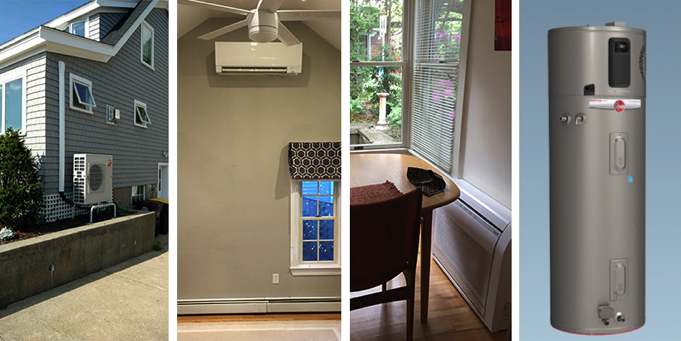Newton is promoting the HeatSmart Newton program, facilitating the move to electric heat pumps for heating, cooling, and hot water. Most Newton households now use natural gas for heating, and some use heating oil or older, inefficient electric technology. In New England, greenhouse gas (GHG) emissions from buildings, especially from heating, are a significant contributor to climate change.
So the question arises, do heat pumps really reduce overall GHG emissions? After all, they use electricity, and isn’t that produced by fossil fuels? The very clear answer is that heat pumps are much better from a climate perspective than traditional heating technologies—and will only get better over time. There are several reasons why that’s the case.
First, electric heat pumps can be up to three times more efficient than traditional heating systems, so moving to heat pump technology dramatically reduces the overall amount of energy used for heating. We should add that in addition to GHG benefits for heating, they also provide a superior air conditioning solution for homes without central air conditioning—quieter and much more convenient than window units.
Second, when you use natural gas for heating (and oil is even worse than natural gas in terms of combustion emissions of greenhouse gases), it comes to your house via the distribution system, which is responsible for the methane gas leaks that we have all been hearing about. Methane is actually much worse from a climate change perspective than carbon dioxide.
Third, in New England, our electricity is sourced about 60% from natural gas and virtually none comes from coal or oil. Using natural gas to generate electricity isn’t good in climate terms, but at least it doesn’t involve the use of the gas distribution system, with its methane leaks.
And finally, the mix of generating resources on the New England electric grid is quickly getting cleaner. By virtue of the State Renewable Portfolio Standards law, all Massachusetts electricity suppliers are required to buy 16% of the electricity they provide in 2020 from renewable sources like solar and wind, increasing by 2% every year. Moreover, offshore wind generation on the East coast is now predicted to reach 30,000 megawatts by 2030. (For reference, a typical medium-sized coal plant is 500 megawatts). Going forward, the Northeast will have plenty of access to renewable power.
There’s one other thing that’s making the New England grid cleaner, and that’s “green” municipal aggregation programs like Newton Power Choice. When you participate, you incentivize electricity suppliers to develop more local renewable resources like solar and wind.
For all these reasons, the clear answer is yes: heat pumps are much better from a climate perspective, and greatly lower harmful emissions as compared with traditional heating technologies.
Craig Forman is the managing coach for the Newton HeatSmart program; and Bill Ferguson and Ann Berwick are Newton Co-Directors of Sustainability.


Recently on Twitter